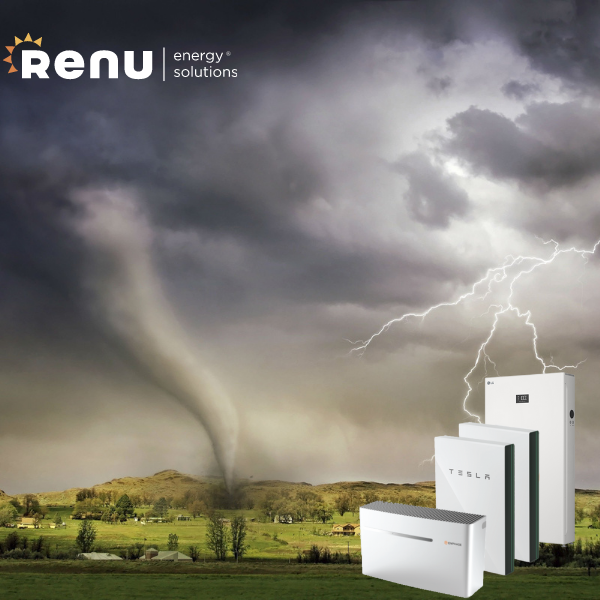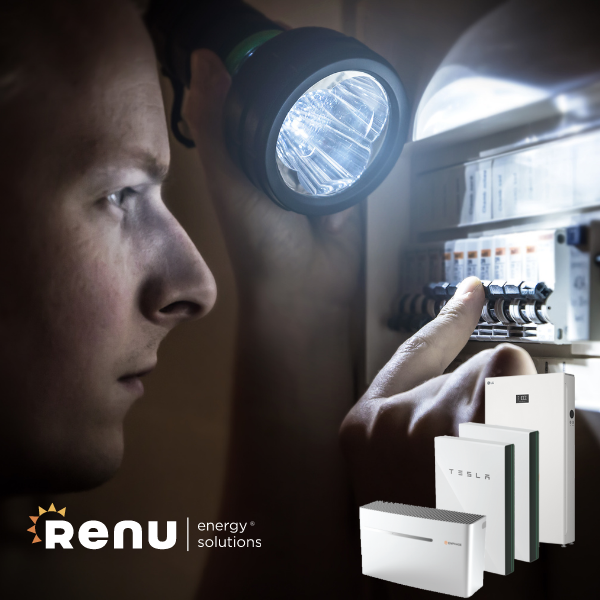
by Renu Energy | Apr 3, 2023 | Renu Blog
Tornado Surge
Last week, the Midwest received a surge of tornadoes ravaging towns in Arkansas, Tennessee, Iowa, and northern Illinois leaving 32 people dead. Towns like Wynne, Arkansas and Covington, Tennessee are left in shambles needing immense amounts of reconstruction. Residents of these towns lost their homes, loved ones, and described their surroundings as a warzone. These communities encountered EF-3 rated tornadoes which have wind speeds ranging from 136 mph to 165 mph.
Storms To Come
Unfortunately, last weeks’ storms are expected to be followed by another severe weather outbreak arriving in the midwest Tuesday afternoon. Affected areas include the Mississippi, Ohio, and Tennessee Valleys. This additional storm surge could result in thunderstorms across the southeast. Those living in the midwest should be prepared to find shelter from potential tornadoes. Homeowners that are not at risk of tornadoes should expect thunderstorms, which means power outages may arise from strong winds, rain, and lightning.
Energy Storage Backup
While the only viable way to prepare for tornadoes is to find safety, homeowners can prepare for thunderstorms by protecting themselves from power outages. With energy storage, homeowners can use their stored energy in the emergence of a power outage. Energy storage units like the Tesla Powerwall and LG ESS Home 8 act as the main grid once the utility grid goes down. Lights will stay on without the homeowner realizing there was a power outage. The Tesla Powerwall even comes with a Storm Mode that activates Backup Reserve. Backup Reserve uses a percentage of the available power to keep home essentials up and running.
Invest In Energy Storage Today
Investing in an energy storage unit for the home is one of the most proactive steps a homeowner can take when preparing for severe weather. Thunderstorms aren’t as devastating as the effects of an EF-3 tornado, but the consequences of losing power for extended periods of time can be dangerous for families who rely on appliances for day to day functions. To learn more about protecting your home and family with energy storage, click here!

by Renu Energy | Mar 27, 2023 | Renu Solar News
Renu Energy Solutions’ Commercial Division is set to install the first commercial PV solar system for a government building in Winston-Salem, NC. The Bryce A. Stuart Municipal Building in downtown Winston-Salem measures at 107,000 square feet with five stories. Last November, the city council approved Renu’s contract at $189,000 for the 70-kilowatt system. The commercial division looks forward to installing this system, as the division is familiar with installing large projects in the area.
The city expects to save $7,000 annually by powering the Bryce A. Stuart Municipal Building with solar energy. With a system lifespan of 25 years, the power savings should pay for the system’s total cost in 19 years. The 2022 Federal Inflation Reduction Act should provide the city with funds to cover 30% of the installation, which makes the total system cost $132,520.
Last December, Renu installed a $589,000 352-kilowatt system on top of the Truliant Federal Credit Union operations center at Hanes Mall. The operations center was formerly the Macy’s building which now has the largest rooftop solar system in the county.
Projects like these aim to help the city of Winston-Salem reach their goal of using 50% renewable energy by 2030.

by Renu Energy | Mar 13, 2023 | Renu Solar News
Before 8am on Sunday morning, nearly 4,000 Duke Energy customers lost power around Nations Ford Road and Arrowood Road. Duke Energy officials state there were two separate outages affecting customers in these areas, and the cause for the outage is unknown. Customers stayed without power for a little over four hours until power was restored around noon.
Most energy customers expect to lose power from extreme weather events like hurricanes, thunderstorms, or even arctic blasts. Sometimes, utility companies experience outages for unknown reasons, which makes energy security more important to have. Unpredictable outages can be prevented with energy storage. For more information on investing in energy storage click here!

by Renu Energy | Mar 8, 2023 | Renu Solar News, Solar-Installer
Today, on International Women’s Day, we celebrate the remarkable women who are making their mark in the solar industry.
In recent years, the solar industry has seen tremendous growth, with solar panels now providing electricity to millions of homes and businesses around the world. Women are playing an increasingly important role in this growth, as scientists, engineers, technicians, and entrepreneurs.
As women in the solar industry, you are not just driving innovation and pushing the boundaries of technology – you are also paving the way for a more inclusive and equitable future. Your work is helping to create a world in which clean energy is accessible to all, regardless of gender, race, or socioeconomic status.
On this International Women’s Day, we honor and celebrate the women in the solar industry who are making a difference. We thank you for your hard work, dedication, and contributions to a better, cleaner, and more sustainable future. You are an inspiration to us all, and we are proud to stand with you in the fight for equality and progress.
Keep shining your light, and know that you are making a difference in the world.

by Renu Energy | Mar 6, 2023 | Renu Solar News
Renu Energy Solutions, a locally owned and operated solar installer based in North Carolina and South Carolina, has partnered with Tesla to bring Tesla Solar Roof tiles to the Carolinas.
As the first certified Tesla Solar Roof installer in North Carolina, the Renu Energy Solutions team is now offering residential customers its innovative tiles made with tempered glass three times stronger than standard roofing tiles and engineered for all-weather durability.
Renu is also among only a handful of certified Tesla Solar Roof installers in South Carolina.
To continue reading Solar Industry’s article written by Ariana Fine, click the here!





